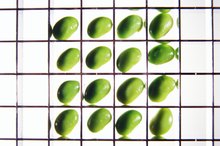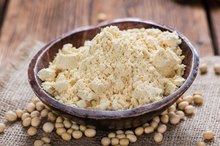What does fact checked mean?
At Healthfully, we strive to deliver objective content that is accurate and up-to-date. Our team periodically reviews articles in order to ensure content quality. The sources cited below consist of evidence from peer-reviewed journals, prominent medical organizations, academic associations, and government data.
- Linus Pauling Institute: Soy Isoflavones
- Alternative Therapies in Health and Medicine: Soy Foods and Supplementation: A Review of Commonly Perceived Health Benefits and Risks
- Alternative Therapies in Health and Medicine: Soy Foods and Supplementation: A Review of Commonly Perceived Health Benefits and Risks
- Molecular Nutrition and Food Research: Lifelong Exposure to Dietary Isoflavones Reduces Risk of Obesity in Ovariectomized Wistar Rats
- Molecular Nutrition and Food Research: Lifelong Exposure to Dietary Isoflavones Reduces Risk of Obesity in Ovariectomized Wistar Rats
- European Journal of Nutrition: Soy Intake is Related to a Lower Body Mass Index in Adult Women
- European Journal of Nutrition: Soy Intake is Related to a Lower Body Mass Index in Adult Women
- MedlinePlus: Hypothyroidism
- Centers for Disease Control and Prevention: Division of Nutrition, Physical Activity and Obesity
- Harvard School of Public Health: The Best Diet: Quality Counts
The information contained on this site is for informational purposes only, and should not be used as a substitute for the advice of a professional health care provider. Please check with the appropriate physician regarding health questions and concerns. Although we strive to deliver accurate and up-to-date information, no guarantee to that effect is made.
Soy Estrogen and Weight Gain
While some people believe that soy triggers weight gain stemming from its plant-based estrogen content, very little is known about how much of an impact soy estrogen has on human estrogen levels. In fact, there's some evidence that including soy in your diet might actually prevent weight gain. If you're concerned about including soy in your diet, consult a professional for personalized diet recommendations.
Soy Estrogen
Soy estrogens, or soy isoflavones, have weak estrogenic activity, which means their chemical structure mimics that of human estrogen, so they're "recognized" as estrogen-like in your body. However, it's not clear exactly how these estrogens affect your cells; they might boost the effects of estrogen, or they may block estrogen from communicating with your cells, essentially reducing estrogen function. Soy estrogens offer several health benefits, including bone health, possible protection against breast cancer, relief from menopausal symptoms and reduced risk of heart disease. The level of soy estrogens you get from your diet doesn't pose a health risk, according to the Linus Pauling Institute 2. However, it's not clear if soy estrogen supplements pose a health risk; if you plan to take them, first consult your doctor.
- Soy estrogens, or soy isoflavones, have weak estrogenic activity, which means their chemical structure mimics that of human estrogen, so they're "recognized" as estrogen-like in your body.
- However, it's not clear exactly how these estrogens affect your cells; they might boost the effects of estrogen, or they may block estrogen from communicating with your cells, essentially reducing estrogen function.
Soy Estrogen and Weight Gain
Soy and Hormonal Imbalance
Learn More
The soy estrogen weight-gain theory may be related to the the belief that the plant-based estrogen affects thyroid hormone levels that can lead to hypothyroidism, an illness associated with weight gain 6. However, according to LPI, high intakes of soy estrogen do not increase your risk of hypothyroidism 6. But people with hypothyroidism may need to eliminate soy foods from their diet to prevent interactions with medication 6.
Estrogen is stored in fat; higher body fat may cause higher estrogen levels, so maintaining a healthy weight, which you could achieve by including low-calorie soy in your diet, will help balance your estrogen levels.
Soy and Healthy Weight
Soy foods and soy estrogen may help you maintain a healthy weight; epidemiological evidence indicates people with a higher intake of soy have lower body mass index, according to a 2008 study published in the European Journal of Nutrition 5. A 2015 animal study, also published in the European Journal of Nutrition, investigated the effects of a soy estrogen-rich diet on weight in rats 5. The researches found that the soy reduced the risk of obesity in the rats and preserved lean body mass. Of course, human studies are necessary to determine a correlation.
Get the benefits of soy with a few tweaks to your diet. Use soy milk for your morning cereal or coffee, add edamame to your salad at lunch, and snack on roasted soy nuts in the afternoon. Use tofu in your next stir-fry.
- Soy foods and soy estrogen may help you maintain a healthy weight; epidemiological evidence indicates people with a higher intake of soy have lower body mass index, according to a 2008 study published in the European Journal of Nutrition 5.
Weight Gain Basics
Foods That Act Like Estrogen
Learn More
Although genetics plays a role, diet and activity level also help determine weight. Eating more calories than your body burns causes weight gain, not a high intake of soy estrogen. Poor-quality foods -- soda, fast food, cake, cookies and fried foods -- lead to weight gain because they increase overall caloric intake. Fruits, vegetables, whole grains and healthy sources of protein such as soy are filling and help you lose weight by assisting you in eating fewer calories.
- Although genetics plays a role, diet and activity level also help determine weight.
- Poor-quality foods -- soda, fast food, cake, cookies and fried foods -- lead to weight gain because they increase overall caloric intake.
Related Articles
References
- Shape: How Too Much Estrogen Can Mess with Your Weight and Health
- Linus Pauling Institute: Soy Isoflavones
- Alternative Therapies in Health and Medicine: Soy Foods and Supplementation: A Review of Commonly Perceived Health Benefits and Risks
- Molecular Nutrition and Food Research: Lifelong Exposure to Dietary Isoflavones Reduces Risk of Obesity in Ovariectomized Wistar Rats
- European Journal of Nutrition: Soy Intake is Related to a Lower Body Mass Index in Adult Women
- MedlinePlus: Hypothyroidism
- Centers for Disease Control and Prevention: Division of Nutrition, Physical Activity and Obesity
- Harvard School of Public Health: The Best Diet: Quality Counts
- Gordon CM, Ackerman KE, Berga SL, et al. Functional Hypothalamic Amenorrhea: An Endocrine Society Clinical Practice Guideline. J Clin Endocrinol Metab. 2017;102(5):1413-1439. doi:10.1210/jc.2017-00131
- Fairview Health Services. Menopause: Effects of Low Estrogen Levels.
- Harvard Health Letter. An update on soy: It's just so-so. Published June 2010.
- Cleveland Clinic. Estrogen & Hormones. Updated April 29, 2019.
- Mayo Clinic. Hormone therapy: Is it right for you? Published May 24, 2018.
Writer Bio
Jill Corleone is a registered dietitian and health coach who has been writing and lecturing on diet and health for more than 15 years. Her work has been featured on the Huffington Post, Diabetes Self-Management and in the book "Noninvasive Mechanical Ventilation," edited by John R. Bach, M.D. Corleone holds a Bachelor of Science in nutrition.









